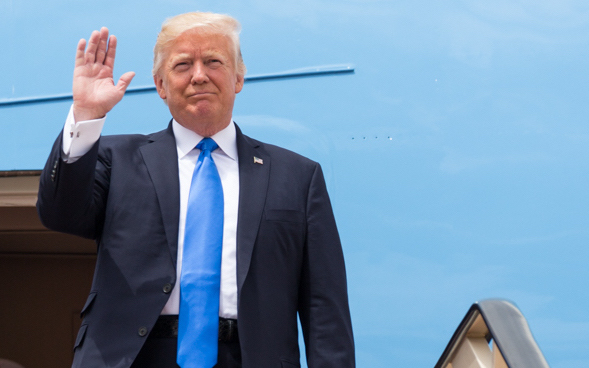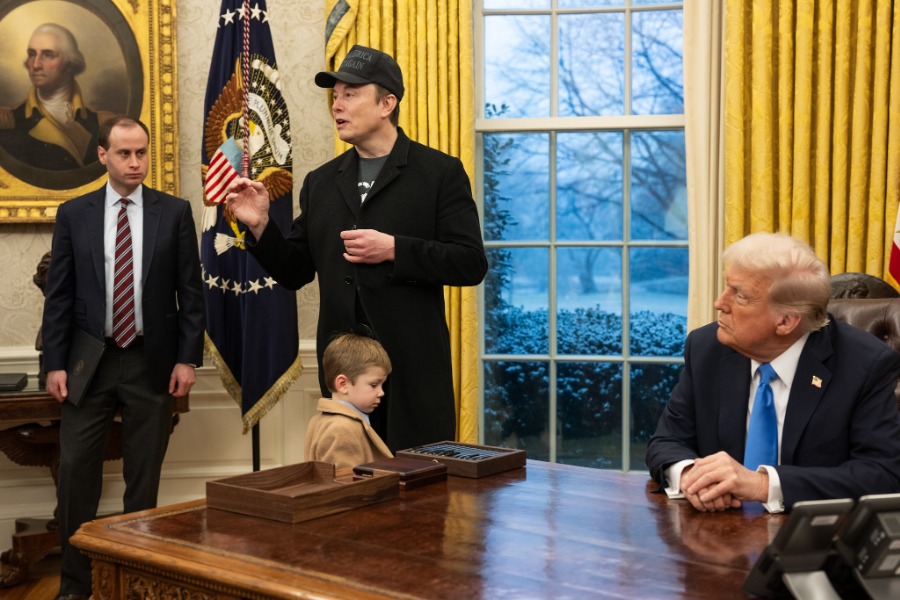Considering Trump’s Legal Position (and Problems) After the New York Times Interview
This morning, Benjamin Wittes wrote in strong terms about the extraordinary interview the president gave the New York Times and what it reveals about Trump’s understanding of legal institutions and the rule of law. The main theme playing through Trump’s comments is that, as president, he has a clear call on the loyalties and responsiveness of Department of Justice and the FBI.

Published by The Lawfare Institute
in Cooperation With

This morning, Benjamin Wittes wrote in strong terms about the extraordinary interview the president gave the New York Times and what it reveals about Trump’s understanding of legal institutions and the rule of law. The main theme playing through Trump’s comments is that, as president, he has a clear call on the loyalties and responsiveness of Department of Justice and the FBI. In this case, as in others, the president displays an ethical posture defined by a narrow and intense concern with his own interests. This is an ethics that may have served him well in business. However, it will have disastrous consequences when carried over into the exercise of his public responsibility as president—a duty to act on behalf of others. Ben suggests the DOJ officials should resign in protest; Jack Goldsmith answers that this would be counterproductive and that the most appropriate strongest response would be for all concerned in senior law enforcement to just do their jobs.
There is also another set of questions that the president’s comments raise—about the nature and structure of his legal defense, and about the further harm Trump may have done to his legal position.
Did his lawyers know of this interview, approve of it, or prepare him for it? It is hard to believe that they did any of this. Normally, lawyers would suggest that the client stop commenting on a pending case, but maybe this president’s lawyers do what they can and just fail time and again. But there are comments and then there are these kinds of comments: whatever the lawyers, perhaps in desperation, give the president latitude to say, it seems impossible they would have advised him to offer up what he did, with gusto, to the Times.
The preliminary damage assessment from at least this outside observer would include this:
“Adoptions” : Trump states that it is “interesting” that this topic of the June 6 meeting was also the focus of his just disclosed sidebar discussion with Vladimir Putin at the G-20. Interesting indeed. “Adoptions” begins to emerge as a code word for "do something about the Magnitsky Act." One is reminded of the Godfather 3, in which those plotting to kill Michael Corleone refer to him as “olive oil.” We now have the president taking up this matter with the Russian president, with no one present, against the background of discussions of “adoptions” between his campaign and visitors from Moscow who were also offering valuable opposition research on Hillary Clinton.
This in turn raises the stakes for the case becoming more of a standard public corruption case: something of value in exchange for a commitment to take an official act (narrowing down the list of Russians subject to visa restrictions and asset freezes pursuant to the Act).
Personal Loyalty—and Obstruction: James Comey testified that the president demanded from him personal fealty. Trump denies it. But the Times attack on his attorney general and deputy attorney general strengthens the case that Comey’s account is accurate. The president resents Jeff Sessions’s decision to recuse himself and says that he would not have nominated an attorney general who intended to follow the recusal rules in this case. He also doubts that he can trust Deputy Attorney General Rod Rosenstein, because he was U.S. attorney in a city, Baltimore, that is Democratic in its voting pattern. In neither case does the president seem to appreciate, or be moved by, the conception of professionalism, including independence and impartiality of judgment. And, of course, Trump’s continued emphasis on the supreme importance to him of loyal subordinates in the ranks of law enforcement will not serve him well as prosecutors form a picture of him in evaluating evidence of obstruction.
The president’s knowledge of the June 6 meeting: The meeting transcript shows the president hedging about his knowledge of the meeting prior to press reports. He says that he did not “look closely” into the email, and then that he “had heard that there was an email,” shifting, strikingly, to the present tense, in saying that “they have information on Hillary Clinton.” When in his account all this takes place is not clear. He does deny that, as the question is put to him, he knew about the meeting “at the time.” Then comes this exchange:
Haberman: No one told you a word, nothing? I know we talked about this on the plane a little bit.
Trump: No, nobody told me. I didn’t know noth--It’s a very unimportant--sounded like a very unimportant meeting.
Haberman is referring to an exchange that took place on Air Force One, in which the press pool reported the president acknowledging ““in fact, maybe [the meeting] was mentioned at some point.” Note that here he breaks off from stating that he knew “nothing” “noth—“ and resumes instead repeating that the meeting was unimportant. In other words, he is preserving the option of saying that he might have heard about the meeting after the fact—the offer and the discussion at Trump Tower—but paid little heed to it, deeming it unimportant. The problem, of course, is that if a delegation comes from Moscow with information from “official sources” supposedly damaging to Hillary Clinton, then the dismissal of its “importance” is somewhat hard to understand.
Legal Strategy. The interview is one more widening of the window on discussions taking place within the White House about a potential firing of Robert Mueller. The president's riff on the history of the FBI's independence since Nixon was plainly the result of a discussion with his legal team. One has to doubt that the president independently and out of personal curiosity researched the Bureau’s institutional history.
Consider that together with the comments from Jay Sekulow on the networks Sunday about the irregularities in the appointment of Mueller, and it appears clear that his team is reviewing with him and actively preparing for this possibility. This is the one aspect of the interview that could have been intended to serve Trump’s legal defense purposes. He is building the case for dismissal with all his claims against Mueller and others of “conflicts” interest, and he reaffirms in the interview that he has that authority: “[I]t can’t be obstruction because you can say: It’s ended. It’s over. Period.”
Few lawyers would say that the president helped his legal position with this interview. It may be that he only cares so much about the substance if he has concluded that he can end it all, “period,” terminating the investigation and then daring the Congress to impeach him. He would then have put the law behind him and it would be all politics. In the end, though he came close, Nixon would not go that far. As president and as “client,” Trump is different.





